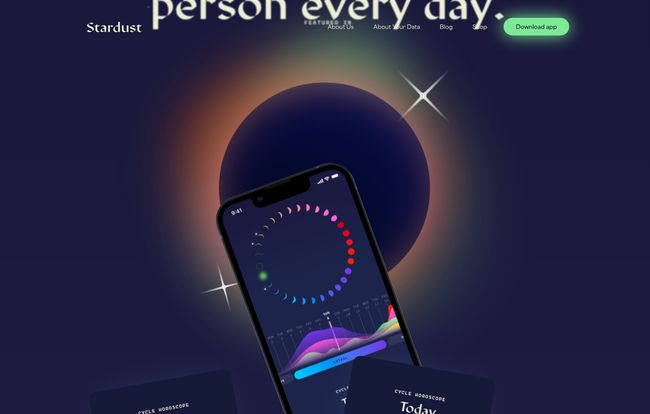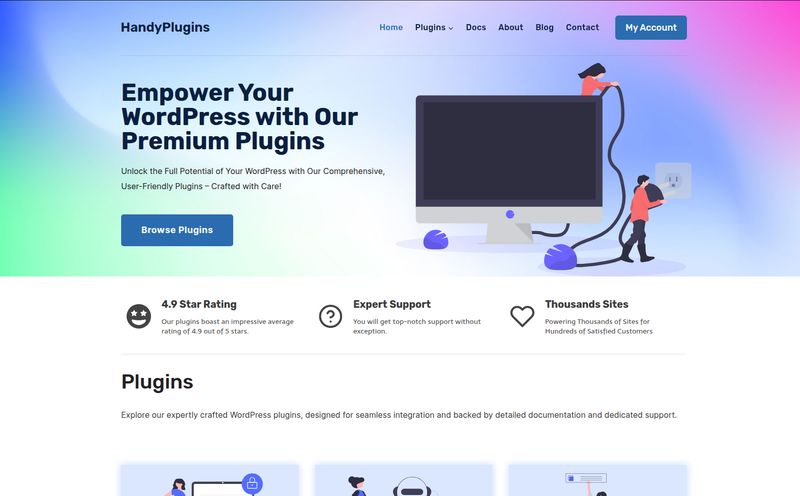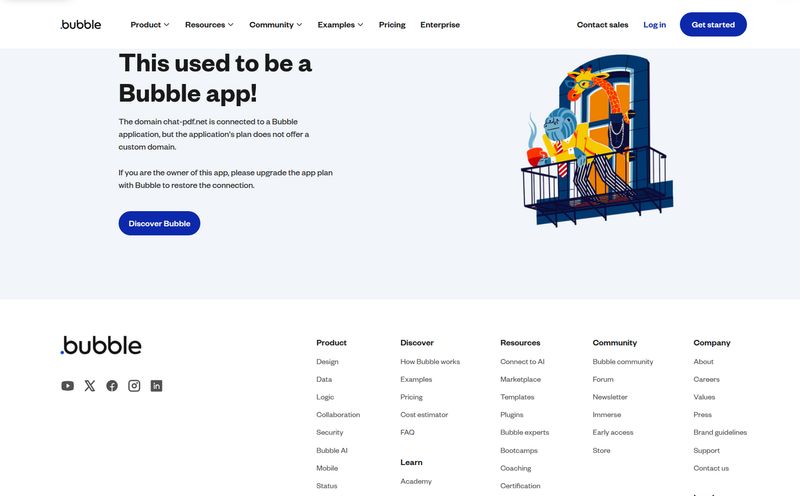The world of wellness apps is… crowded. Especially when it comes to cycle trackers. I’ve probably downloaded and deleted a dozen of them over the years. They’re often pink, flowery, and a bit… sterile. They tell you the what and the when, but they completely miss the why and the how it all feels. You know, the messy, magical, and sometimes maddening experience of having a hormonal cycle.
Then I stumbled upon Stardust. The name alone caught my eye. It didn’t scream “clinical period tracker.” It whispered of something more mystical, more connected. And honestly, after years of looking at sterile charts, I was ready for a little magic.
So, I dove in. And what I found was pretty interesting. It's not your average tracker, that’s for sure. It’s a bit of an enigma, wrapping hard science in a blanket of starlight and folklore. But is it actually useful? That’s the big question.
What is the Stardust App, Really?
At its core, Stardust is a free cycle tracking app for your period, ovulation, and even pregnancy. Okay, standard stuff so far. But here’s the twist: it was built by women and integrates modern science with astronomy, AI, and what they call “ancient wisdom.” Think of it as a pocket astrologer for your hormones. Instead of just plotting data points on a graph, it tries to weave a narrative, connecting your internal hormonal shifts with the external pull of the moon.
It’s a bold concept. Some might immediately roll their eyes, and I get it. The wellness space is full of questionable claims. But Stardust seems to be trying to find a middle ground—a place where you can track your cervical fluid and also consider what it means that the moon is in Waxing Gibbous. It’s an approach that aims to make you befriend your body, not just monitor it.
More Than Just a Period Tracker: My First Impressions
Opening the app for the first time feels different. The dark, cosmic aesthetic is a welcome change from the clinical white and pastel pinks of other apps. It immediately sets a tone that’s more introspective and, dare I say, cool. It feels less like a medical device and more like a personal journal.
The Cosmic Vibe and Interface
The main screen features a circular dial that visualizes your cycle, tying it visually to lunar phases. It’s intuitive and, frankly, beautiful. The language it uses is also unique. It gives you daily insights that feel more like a horoscope or a thoughtful daily affirmation than a cold data report. “During the Luteal phase, you might feel more introverted.” Yeah, tell me about it.
You log your symptoms like in any other app—cravings, mood, acne, flow, sex drive—but the context is different. It’s all framed within this larger cosmic dance. Is my sudden need for chocolate written in the stars? According to Stardust, it just might be connected to my hormones and the cosmos.

Visit Stardust App
Syncing with the Moon (And Your Friends)
One of the most unique features is the emphasis on menstrual-lunar synchronicity. For centuries, folklore has connected menstrual cycles to the moon's 29.5-day cycle. Stardust leans into this heavily. Whether you believe in the connection or not, it’s a fascinating way to reframe your experience.
And then there’s the community aspect. You can actually sync your cycle with friends. I was a bit hesitant about this at first, but it’s actually brilliant. It’s a private, consensual way to know when your best friend might also be feeling the pre-menstrual slump, making it easier to offer support (or just commiserate over a pint of ice cream). It fosters a sense of shared experience that is often missing from our very individual health journeys.
The Big Question: Is My Data Safe with Stardust?
Okay, let’s get serious for a moment. In the current climate, particularly in the US, the privacy of period tracking data isn’t just a feature—it’s a fundamental necessity. We've all seen the headlines. The idea of our most personal health data being sold or subpoenaed is terrifying. This is where I, as a tech-focused blogger, get really critical.
And this is where Stardust scores a massive, massive point. They are very vocal about being data-encrypted. This means they can't see your data, and if they can't see it, they can't sell it or hand it over. They claim to have built their app with this privacy-first approach from the ground up. For me, and for many users I’m sure, this is a non-negotiable feature. It transforms the app from a fun novelty into a genuinely viable and safe tool. It’s a huge trust signal in a field where trust has been badly broken.
Key Features That Stand Out
Beyond the moon and stars, the app has a solid foundation of practical features. You can track dozens of symptoms and moods, which the app’s AI then uses to generate personalized trends and insights. Over time, it might show you patterns you never noticed, like how your sleep is affected during your follicular phase or how your energy peaks around ovulation.
The hormone insights are also pretty cool. It gives you a general idea of whether your estrogen, progesterone, or testosterone are high or low on any given day, and explains what that might mean for your mood, energy, and skin. It’s a simplified take on endocrinology, but its a great starting point for better body literacy.
What's the Catch? A Look at the Downsides
No app is perfect, and Stardust is no exception. Let’s look at a few things to keep in mind.
First, like any self-tracking app, its accuracy depends entirely on you. If you forget to log symptoms or your period start date, the predictions will be off. The AI is only as smart as the data you give it. Second, the heavy reliance on AI and astronomy might not be for everyone. If you’re a just-the-facts kind of person, the cosmic insights might feel a bit like fluff. And that’s fair. And while the app is free, they do have a shop where you can buy branded merchandise. It's not pushy, but its there.
So, How Much Does Stardust Cost?
This is the best part. Stardust is free to use. There are no premium subscription tiers or paywalls for key features. I even tried to find a pricing page on their website, and it returned a 404 error, which pretty much confirms it. The business model seems to revolve around their separate online shop for merchandise. This free-to-use model, combined with the strong privacy stance, makes it incredibly accessible.
Is the Stardust App Right for You?
So, should you download it? In my experience, it comes down to what you’re looking for.
The Stardust app might be your new best friend if:
- You're tired of cold, clinical-feeling trackers.
- You’re interested in astrology, mythology, or just a more holistic view of your body.
- Data privacy is your number one concern.
- You love the idea of syncing up with friends and fostering a small community.
- You want an app that does more than just predict your next period.
You might want to stick with a different app if:
- You want pure, unadulterated science with no spiritual or astrological flair.
- You're not diligent about logging your symptoms daily.
- The idea of connecting your cycle to the moon makes you cringe.
Frequently Asked Questions about the Stardust App
What exactly is the Stardust app?
Stardust is a free period, ovulation, and pregnancy tracking app that combines science, AI, and astronomy to provide personalized insights. It’s known for its unique focus on menstrual-lunar synchronicity and its strong data privacy policy.
Is the Stardust app really free?
Yes, the app and all its tracking features are completely free. They make money through an optional online shop where they sell merchandise.
How does Stardust protect my privacy?
Stardust uses data encryption, which means they cannot access, view, or sell your personal cycle data. This privacy-first approach is a core part of their platform, making it one of the safer options on the market.
How does the app use astrology and astronomy?
The app maps your hormonal cycle phases against the phases of the moon and corresponding astrological signs. It provides daily insights based on these connections, blending scientific hormonal information with ancient folklore and lunar wisdom.
Can I track my pregnancy with Stardust?
Yes, the app includes a pregnancy tracking mode, allowing you to follow your journey from conception onwards with the same blend of science and cosmic insight.
What is cycle syncing with friends?
It's an optional feature that allows you to privately share your cycle information with friends who also use the app. It's designed to help you support each other and understand each other's hormonal phases.
My Final Thoughts
In a sea of sameness, the Stardust app is a breath of fresh, cosmic air. It’s not going to be for everyone, and that’s okay. Its creators clearly knew who their audience was: people who feel a connection to the mystical, who want to understand their bodies on a deeper level, and who, above all, demand privacy. It successfully bridges the gap between the practical need for a tracker and the human desire for meaning and connection.
For me, it’s a keeper. It’s made the mundane task of logging symptoms feel a little more magical. And in today’s world, I’ll take all the magic I can get.
Reference and Sources
- Stardust Official Website: https://www.thestardustapp.com/
- An article on Femtech and data privacy, for context: The Future Of Femtech: Privacy And Data Security from Forbes



